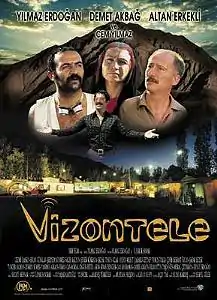Vizontele
Vizontele is a 2001 Turkish comedy-drama film, written and directed by Yılmaz Erdoğan and co-directed by Ömer Faruk Sorak, based on the writer-director's childhood memories of the arrival of the first television to his village in the early 1970s. The film, which went on nationwide release on February 2, 2001, won three Golden Orange awards and was one of the most successful Turkish films to that date. A sequel, entitled Vizontele Tuuba, involving the director and most of the original cast followed in 2004.
| Vizontele | |
|---|---|
 Theatrical Release Poster | |
| Directed by | |
| Produced by | Baran Bolat |
| Written by | Yılmaz Erdoğan |
| Starring |
|
| Music by | Kardeş Türküler |
| Cinematography | Ömer Faruk Sorak |
| Edited by | Mustafa Preşeva |
Production company | Beşiktaş Kültür Merkezi Bocek Yapim |
| Distributed by | Warner Bros. |
Release date |
|
Running time | 110 mins |
| Country | Turkey |
| Language | Turkish |
Production
The film was shot on location in Gevaş, Van Province, Turkey.[1]
Synopsis
The mayor (Altan Erkekli) of a small village in Southeastern Turkey in the 1970s bitterly opposes the activities of sleazy opportunist Latif (Cezmi Baskın) who runs open-air film screenings and seeks to break his monopoly over village entertainment with the introduction of the first television (called Visiontele by the locals). The mayor recruits a crazy electrician called Emin (Yılmaz Erdoğan) and some of his office staff to help him to set up a television transmitter on the highest position of the mountain. While Latif seeks to undermine his efforts by decrying television as the work of the Devil and a slap in the face of Islamic tradition. The story is based on the childhood memories of the writer-director Yılmaz Erdoğan of the arrival of the first television to Hakkâri, Turkey in the early 1970s.
Societal conflicts
The movie tries to represent one of the main conflicts in the Turkish society of the late 1970s, continuing well into the 1980s; that of the religious versus secular groups. "[T]here have always been struggles and contests between secular groups and religious groups over the nature of the political system."[2] This is partly shown through the image of the clergyman of the town, who stutters a lot, and apparently feels vitriolic toward the new-coming television, but later on turns out to be a pawn at the hands of Latif. Children escape his Quran reading class in order to go into the wild and frolic. An obvious point the movie makes in favor of secular ideas is the character of [crazy] Emin (played by one of the directors: Yılmaz Erdoğan). He is pictured as someone who is secluded and one whose only interest is modern technology. But the movie makers are clever enough not to take sides with either side of the conflict. As put eloquently by Başkan, "According to secularization theory, modernization leads to a decline in religion's role in the public realm, with it turning into a matter for the private sphere. Instead, however, the contemporary world has witnessed a resurgence of religion with the emergence of religious movements throughout the world."[3] The first piece of news that the inhabitants get to hear on the new television - that the Mayor's son, who was serving in the Army, was killed during the Turkish invasion of Cyprus in 1974 - is so devastating that a burial of the TV set is in order; an iconic replacement of the burial of the beloved son. And the man who has to bury the TV set is no other than the technocrat of the town, on allegations that it has brought evil to the small community of the religious people.
Cast
- Yılmaz Erdoğan as Deli Emin
- Demet Akbağ as Siti Ana
- Altan Erkekli as Mayor Nazmi
- Cem Yılmaz as Fikri
- Cezmi Baskın as latif
- Bican Günalan as Sezgin
- Sebnem Sönmez as Gulizar
- Iclal Aydin as Reyhan
- Mesut Çakarli as Rifat
- Zeynep Tokus as Asiye
- Tolga Çevik as Nazif
- Tuncer Salman as Ahmet
- Salih Kalyon as Casim
- Sener Kökkaya as Basri
- Erdal Tosun as Sehymus
- Şafak Sezer asVeli
- Adem Atbas as Fatih
- Serhat Özcan as Engin
- Caner Alkaya as Iso
- Can Kahraman as Ezo
Awards
- Cologne Mediterranean Film Festival (2001)
- Audience Award (won)
- Antalya Golden Orange Film Festival (2001)
- Golden Orange for Best Actor: Altan Erkekli (won)
- Golden Orange for Best Actress: Demet Akbağ (tied with Yesim Salkim for Sarkici)
- Golden Orange for Best Music: Kardeş Türküler (won)
See also
References
- "Filming locations for Vizontele". IMDB. Retrieved 2010-02-18.
- Başkan, Filiz. (2010) "Religious versus Secular Groups in the Age of Globalisation in Turkey" page 167
- Başkan, Filiz. (2010) "Religious versus Secular Groups in the Age of Globalisation in Turkey" page 168
